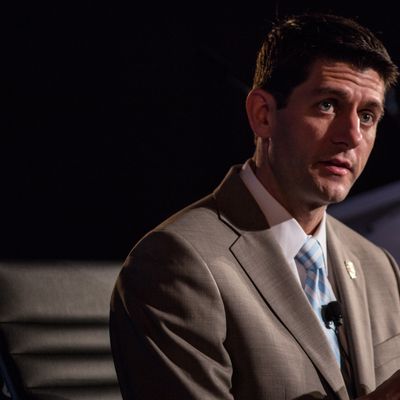
I’m not sure I believe in Freudian slips, and Barack Obama made a similar mistake when he introduced Joe Biden four years ago, but what the hell: When Mitt Romney slipped up this morning and introduced Paul Ryan as “the next president of the United States,” he spoke the truth. The premise of my April profile was that Ryan had become the leader of the Republican Party, with the president himself relegated to a kind of head-of-state role, at least in domestic affairs. As Grover Norquist put it, the only requirement for a nominee was enough working digits to sign Ryan’s plan. Ryan’s prestige within the party is unassailable. If he doesn’t want something to happen, it won’t happen (say, several bipartisan deals to reduce the deficit that he squashed.) If he wants something to happen, however foolhardy (like putting the entire House GOP caucus on record for his radical budget plan despite a certain veto) it will happen. It is Ryan’s party.
The only real question left was how to handle the optics of this reality. The original operating plan of the Romney campaign was to run against the bad economy, and then implement the Ryan Plan, which of course is a long-term vision of government unrelated to the current state of the labor market. Romney’s campaign had been bravely insisting for weeks that the plan was working, or that it was due for a 1980-like October leap in the polls, but clearly Romney did not believe, or had come to disbelieve, its own spin.
So Romney is conceding that the current track of the campaign is headed for a narrow defeat and has decided to alter its course. Obama has successfully defined Romney as an agent of his own economic class, a ploy that was clearly designed to make the attacks on Romney’s policy agenda hit home. (Focus groups had previously found that undecided voters found literal descriptions of Romney’s plan so radical they didn’t believe them.)
Romney has made the risky but defensible calculation that, if he is to concur with most of his party’s ideological baggage, he might as well bring aboard its best salesman. And Ryan is that. During his rise to power he has displayed an awesome political talent. He is ambitious but constantly described by others as foreswearing ambition. He comes from a wealthy background but has defined himself as “blue collar,” because he comes from a place that is predominantly blue collar. He spent the entire Bush administration either supporting the administration’s deficit-increasing policies, or proposing alternative policies that would have created much higher deficits than even Bush could stomach, but came away from it with a reputation as the ultimate champion of fiscal responsibility.
What makes Ryan so extraordinary is that he is not just a handsome slickster skilled at conveying sincerity with a winsome heartland affect. Pols like that come along every year. He is also (as Rich Yeselson put it) the chief party theoretician. Far more than even Ronald Reagan, he is deeply grounded is the ideological precepts of the conservative movement — a longtime Ayn Rand devotee who imbibed deeply from the lunatic supply-side tracts of Jude Wanniski and George Gilder. He has not merely formed an alliance with the movement, he is a product of it.
In this sense, Ryan’s nomination represents an important historical marker and the completion of a 50-year struggle. Starting in the early sixties, conservative activists set out to seize control of the Republican Party. At the time the party was firmly in the hands of Establishmentarians who had made their peace with the New Deal, but the activists regarded the entire development of the modern regulatory and welfare states as a horrific assault on freedom bound to lead to imminent societal collapse. In fits and starts, the conservatives slowly advanced – nominating Goldwater, retreating under Nixon, nominating Reagan, retreating as Reagan sought to govern, and on and on through Gingrich, Bush, and his successors.
Over time the movement and the party have grown synonymous, and Ryan’s nominations represents a moment when the conservative movement ceased to control the politicians from behind the scenes and openly assumed the mantle of power.






























